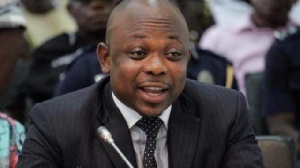Opinions of Friday, 9 September 2016
Columnist: Okoampa-Ahoofe, Kwame
Would James Agalga deny this?
By Kwame Okoampa-Ahoofe, Jr., Ph.D
A couple of days ago, I came across an article on one of the country’s media websites in which a virulent critic of the outgoing Moderator of the General Assembly of the Presbyterian Church of Ghana (GA-PCG) was calling for Prof. Emmanuel Martey to be bumped off the National Peace Council (NPC) as a member representing the Christian Council of Ghana (CCG).
The Christian Council is largely composed of the mainline protestant churches. Prof. Martey must have found such call to be very laughable because as he told an audience at the Abetifi Presbyterian University College recently, not only has he turned down the request of his CCG colleagues to represent the entire membership of the Council on the NPC, a deputy ministerial appointee in the Mahama-led government of the National Democratic Congress (NDC) has actually put through a personal phone call urging the Presbyterian prelate to vie for the Chairmanship of the Peace Council to no avail.
This time around, however, Prof. Martey decided to take no hostages, in the evergreen words of late United States’ Republican President Ronald Reagan. Prof. Martey has finally named names, obviously because the issue at stake here appears to be less damning and somewhat less personal than those he has anecdotally narrated publicly that involved bribery and corruption. The common thread here, though, still verges on bribery and corruption. It well appears that somebody had decided that Rev. Martey was mordantly afflicted with an oversized ego and decided to trip the spiritual head of the Presbyterian Church of Ghana on the same. Predictably, here too, the trick and trap woefully misfired. Had Prof. Martey taken the bait, no doubt, it would have been the cheapest and most successful bribery attempt.
You see, Christian religious leaders like the outgoing PCG prelate tell these odd-sounding stories in order to shore up the disciplinary will-power of their followers and associates. There is, of course, a striking element of self-glorification here; but such element of self-glorification is more incidental than it is the main focus of the anecdotal narrative.
Dr. Martey revealed to his Abetifi audience that the cold-calculating ego-tripping ministerial appointee was none other than the Hon. Mr. James Agalga, Ghana’s Deputy Minister of the Interior.
According to the erudite narrator, as he was to learn shortly thereafter, Mr. Agalga had deliberated on this strategic tack aimed at buying off his complicit silence at the cheapest of budgetary expenditure with his immediate superior, the substantive Minister of the Interior, prior to an initial call put through to Prof. Martey which met with the absence of its intended target.
A second attempt at snagging the human strategic target would come in the form of a text message, confirming the fact that, indeed, it was the deputy Interior ministerial second-bananas who had put through the initial call.
In all the preceding, what is important and pertinent to underscore here is the fact that as an outspoken leader of a major Ghanaian church, unarguably one of the most progressive of its kind and size, Prof. Martey had become a thorn in the side of the National Democratic Congress.
In those revolutionary bad, old days, the Accra native may well have been abducted in the thick of darkness to dance a Kpanlogo accompaniment to the Adowa and Abomaa dance steps of the three Akan-descended Accra High Court judges savagely abducted from the sacred comfort of their homes and brutally murdered by assigns of the Rawlings-Tsikata regime.
We do not make the foregoing observations to imply that, somehow, Prof. Martey is lucky to be living in a more auspicious and enlightened time. It is quite certain that rather than being a passive beneficiary of the times, Prof. Martey could actually be aptly envisaged as one of the beneficent human social forces that have prevented the country from relapsing into the barbaric culture of yesteryear.
That he is completely unfazed, rather than determined, to be made a martyr of a godly cause, should the need and occasion arise, is a benevolent trait of Moderator Martey that ought to be unreservedly celebrated in both Ghana and abroad.
It is also his dogged determination to hold onto the courage of his convictions that makes Moderator Martey the most dangerous critic of the Mahama-led government of the so-called National Democratic Congress.













